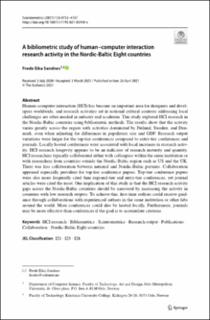A bibliometric study of human–computer interaction research activity in the Nordic-Baltic Eight countries
Peer reviewed, Journal article
Published version
Permanent lenke
https://hdl.handle.net/11250/2832983Utgivelsesdato
2021Metadata
Vis full innførselSammendrag
Human–computer interaction (HCI) has become an important area for designers and developers worldwide, and research activities set in national cultural contexts addressing local challenges are often needed in industry and academia. This study explored HCI research in the Nordic-Baltic countries using bibliometric methods. The results show that the activity varies greatly across the region with activities dominated by Finland, Sweden, and Denmark, even when adjusting for differences in population size and GDP. Research output variations were larger for the top-tier conferences compared to entry-tier conferences and journals. Locally hosted conferences were associated with local increases in research activity. HCI research longevity appears to be an indicator of research maturity and quantity. HCI researchers typically collaborated either with colleagues within the same institution or with researchers from countries outside the Nordic-Baltic region such as US and the UK. There was less collaboration between national and Nordic-Baltic partners. Collaboration appeared especially prevalent for top-tier conference papers. Top-tier conference papers were also more frequently cited than regional-tier and entry-tier conferences, yet journal articles were cited the most. One implication of this study is that the HCI research activity gaps across the Nordic-Baltic countries should be narrowed by increasing the activity in countries with low research outputs. To achieve this, first-time authors could receive guidance through collaborations with experienced authors in the same institution or other labs around the world. More conferences could also be hosted locally. Furthermore, journals may be more effective than conferences if the goal is to accumulate citations.

